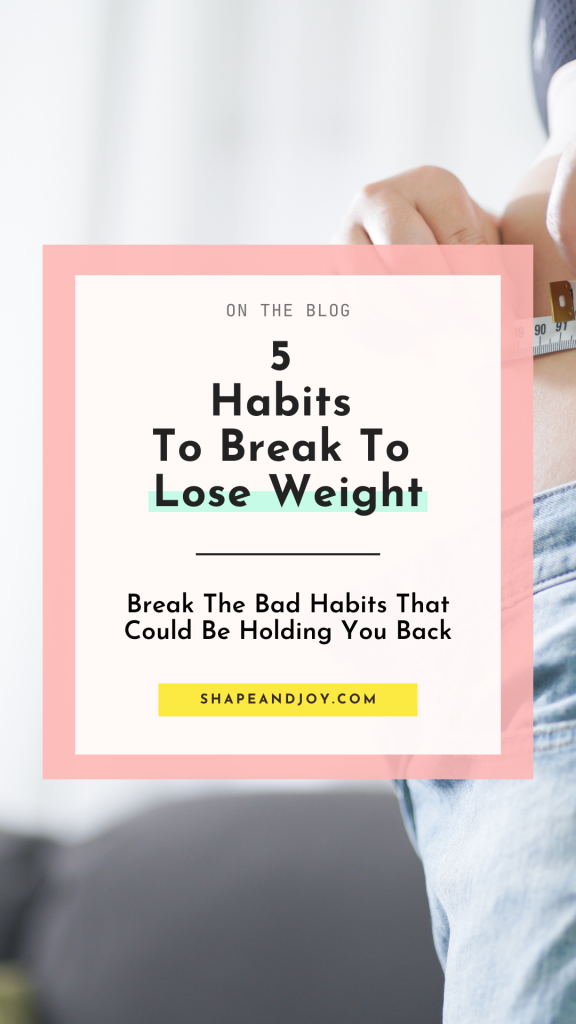This post may contain affiliate links, which means that I may earn a commission if you click on the link, with no cost for you. It’s one of the ways I support my blog. You can read more about this here.
Introduction
Are you struggling to lose weight and don’t know why? It may not be what you’re eating, but rather the subtle habits you’ve developed that are sabotaging your efforts. Most of us are aware of the traditional “bad” habits that slow down weight loss or cause weight gain. But sometimes it’s behaviours we would never think of that preventing us from reaching goals. And it’s often these small but impactful habits that are sabotaging your weight loss. By focusing on these habits to break to lose weight, you can make progress toward your fitness goals, without killing your dedication.
SEE MY COMPLETE GUIDE ON HABIT FORMATION > Mastering Habit Formation and Behaviour Change For Your Health
LEARN MORE ABOUT MY WEIGHT LOSS JOURNEY! > How I Lost Over 80lbs: Tips For Starting A Weight Loss Journey

1. Not Getting Enough Sleep
The link between getting enough sleep and weight often goes unnoticed. But, better sleep and a healthy weight often go hand-in-hand. Getting enough sleep is essential for maintaining healthy physical, mental, and emotional wellbeing.
Insufficient sleep has consistently been linked to higher body mass index (BMI) in studies. Multiple mechanisms may connect sleep deprivation to weight gain and obesity. This includes higher calorie consumption, reduced energy expenditure, and affects on levels of hormones that regulate appetite.
A lack of sleep can increase calorie intake because when you don’t get enough sleep, your body releases more of the hormone Ghrelin, and decreases the hormone Leptin. Ghrelin, sometimes called the “hunger hormone,” stimulates appetite, increases food intake and promotes fat storage. Leptin, on the other hand, is an appetite suppressant, telling the brain when the body has had enough to eat. Together, these hormones help to regulate energy intake and expenditure, ensuring that the body has the right amount of energy.

How Much Sleep Do You Need?
It’s generally recommended that adults get between 7 to 9 hours of sleep per night. But, things like age, health, lifestyle, and stress levels can influence the ideal amount of sleep for different people. It’s important to pay attention to your own body and adjust your sleep patterns based on how you feel.
Breaking bad habits can stop those common beginner mistakes from derailing your progress. Don’t let these mistakes hold you back—check out 5 Weight Loss Mistakes Beginners Make.
Tips For A More Restful Sleep
- Have a Consistent Schedule: Aim to go to bed and wake up at the same time every day. This helps regulate your body’s internal clock.
- Create a Bedtime Routine: Develop a pre-sleep routine that includes calming activities, like reading, meditating, or listening to relaxing music. This signals to your body that it’s time to wind down.
- Change Your Sleep Environment: Make your bedroom conducive to sleep by keeping it dark, quiet, and cool. Avoid having items that usually cause you stress in your bedroom, like a work laptop.
- Limit Screen Time Before Bed: Reduce exposure to screens at least an hour before bedtime. The blue light from phones and computers can mess with the production of melatonin, a hormone that regulates sleep.
- Watch Your Diet: Avoid heavy meals, caffeine, and alcohol close to bedtime. Go for a light snack if you’re hungry before sleep.
- Exercise: Regular exercise can promote better sleep, but try to finish your workout a few hours before bedtime.
- Manage Stress: Practice relaxation techniques like deep breathing, meditation, reading or journaling to help manage stress and calm your mind before you go to sleep.
POSTS YOU MAY BE INTERESTED IN:
Daily Habits To Improve Your Life: 10 Habits To Try Today
2. Eating Too Much “Diet” Food

By “diet” food, I mean packaged products that are marked as low-fat/low-calorie alternatives. When a product has reduced fat content, manufacturers need to compensate for the loss of flavour and texture that fat brings by adding sugar. These Low-fat options with high sugar content might give you a temporary sense of fullness due to the quick energy spike from sugar. But, the feeling is often short-lived, as the rapid rise in blood sugar is followed by a crash, often leaving you feeling hungry and craving more food.
The high sugar content in low-fat products can trigger cravings for even more sweet foods. The cycle of sugar spikes and crashes can create a rollercoaster effect on hunger and satiety. This can make it more difficult for you to maintain a consistent and balanced eating pattern.
Many of these options are considered processed foods, whereas what should be prioritised is whole nutrient-dense foods. These are foods in their natural state, unprocessed or minimally processed, and rich in essential nutrients. Whole foods not only provide the nutrients you need but also support a more stable energy level throughout the day. This, in turn, aids in regulating hunger and promoting satiety.
This doesn’t mean that you shouldn’t eat any low-fat options, just be mindful of the nutrition label and pay attention to the added sugar content.
One habit that could be sabotaging you is all-or-nothing thinking. If you’re stuck in this mindset, you’ll want to read All-Or-Nothing Thinking.
POSTS YOU MAY BE INTERESTED IN:
- Science-Based Nutrition: 5 Tips To Lose Weight The Healthy Way
- Lose Weight By Knowing Which Foods To Avoid
3. Stress Eating
Stress eating, or emotional eating, is when food becomes a source of comfort when you’re stressed or upset. This coping mechanism, while providing temporary comfort, can contribute to weight gain and impact your overall well-being.
But when stress, in particular, becomes a constant in your life, it often brings along weight-related challenges. The body’s response to stress triggers the release of cortisol, a hormone that, when elevated over time, can lead to increased appetite and a preference for high-calorie, comfort foods.
Tips to Avoid Emotional Eating Without Turning to Food
- Practice Mindful Eating: That means focusing on your meal, tasting it, and noticing when you are full.
- Distract Yourself: Go for a walk, read a book, or do some yoga.
- Journal: Writing down your thoughts and feelings can help you to process them and gain some perspective.
- Talk To Someone: Reaching out to someone can help you to feel more connected and not so alone in your struggles.
- Practice Self-Care: Take some time to relax and do something that you enjoy.
- Go Easy On Yourself: Remember that you are doing the best you can and that mistakes are part of the learning process.
POSTS YOU MAY BE INTERESTED IN:
- Stress Eating? Experience A Healthier, Happier Life: Conquer Emotional Eating Today
- Get Rid Of Stress Belly: Practical Tips

4. Skipping Meals
Skipping meals is not an effective way to manage your calorie intake and should be an easy one on your list of habits to break to lose weight. It will usually only leave you feeling hungrier, and as a result, you could end up eating more than you normally would when you do eventually sit down to eat. The impact of skipping meals also goes beyond the quantity of calories consumed. It affects the quality of your food choices, as hunger can drive you towards convenient but less healthy, calorie-dense choices.
When you skip a meal, especially if it’s a long period since your last one, your blood sugar levels can dip below the ideal range. This drop can trigger a range of different physiological responses, including fatigue and irritability. In an attempt to quickly elevate blood sugar, your body may signal strong cravings for foods that provide rapid energy, often leaving you craving sugary foods.
The ideal time between meals varies between person to person, but the best way to figure it out is to simply listen to your body, eat when you’re hungry, and stop when you’re full. And eat a nutrient-dense diet focusing on satiety to ensure you are providing your body with the essential nutrients it needs.

When you eat by listening to your body’s natural cues, you’re more likely to make thoughtful food choices and develop a healthier relationship with food.
POSTS YOU MAY BE INTERESTED IN:
- Unconditional Permission To Eat For Sustainable Weight Loss
- Meal Frequency: How Often Should I Eat To Lose Weight?
5. Relying on Willpower Alone
While willpower is a valuable tool in making positive changes, relying on it alone has limitations in sustaining habits long term. Willpower and motivation is a finite resource that can be depleted by stress, fatigue, or other life demands. When faced with constant challenges or temptations, depending solely on willpower becomes a vulnerable strategy.
Willpower requires continuous effort and attention. To make lasting sustainable changes, healthier habits need to become ingrained in your daily routine to the point where they are automatic, reducing the reliance on conscious effort.
A sustainable weight loss journey built on healthy habits should have a balance of willpower, motivation, consistency and discipline.

Tips To Stay Motivated
- Intrinsic Motivation: Find your “Why” – Identify the deeper reasons behind your motivation for change. Connecting your habits to personal values and long-term goals enhances intrinsic motivation.
- Set Clear Goals: Set specific, measurable, achievable, relevant, and time-bound (SMART) goals. Clarity in your goals provides a roadmap for your journey, keeping you focused and motivated.
- Build a Support System: Surround yourself with a supportive network of friends, family, or a community that shares similar goals.
- Celebrate Non-Scale Victories: Acknowledge and celebrate achievements outside of weight loss goals. Even noticing improvements in energy levels, mood, or overall well-being are important indicators of success.
- Adaptability and Resilience: Accept that setbacks happen, and view them as opportunities to learn and readjust your approach. Practicing resilience will enable you to bounce back and stay committed.
- Self-Compassion: Treat yourself with kindness and understanding. Developing a mindset of self-compassion mitigates the impact of setbacks, fostering a positive relationship with yourself and your journey.
- Gentle Discipline: Hold yourself accountable in a compassionate manner. Instead of dwelling on perceived failures, view missteps as opportunities for learning and growth. This compassionate accountability reinforces your commitment to positive change while maintaining a nurturing and forgiving approach to your weight loss journey.
Simplifying your approach to weight loss makes it easier to break those bad habits. Learn how in How to Lose Weight Without Thinking About It.

POSTS YOU MAY BE INTERESTED IN:
- Smart Weight Loss Goals: How To Make A Plan To Lose Weight
- Why Motivation (Alone) Doesn’t Work For Weight Loss
Habits To Break To Lose Weight: Conclusion
A successful and sustainable weight loss journey is not only about the foods you eat; it’s about the habits you have. By addressing these habits to break to lose weight, you can make lasting changes that go beyond losing weight. Working towards better health shouldn’t be a sprint but a marathon, where the focus shifts to the cultivation of enduring habits. Each small step you take, each mindful choice you make, is you making a commitment to a healthier lifestyle.
Have you found ‘5 Habits To Break To Lose Weight‘ helpful? Are you “guilty” of any of these habits? Let me know in the comments below!

